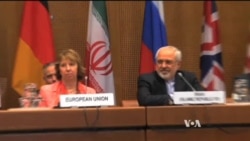LONDON —
Negotiators from Iran and the so-called P5+1 - the United States, Russia, China, Britain, and France, plus Germany - wrapped up a round of talks Wednesday in Vienna on Tehran’s nuclear program. The West believes Iran is trying to build a nuclear weapon, a charge Tehran denies, and negotiators remain a long way from reaching agreement.
This is third time negotiators from Iran and the P5+1 have met this year in Vienna.
EU foreign affairs chief Catherine Ashton, who is coordinating the talks, admitted to ‘significant gaps’ between the parties. “A lot of intensive work will be required to overcome the differences which naturally at this stage still exist in the process.”
All sides hope to sign a comprehensive agreement by a self-imposed July 20 deadline.
Iranian nuclear enrichment
Iran leader Ayatollah Ali Khamenei has insisted in the past Iran will never give up nuclear enrichment or shut any nuclear facility. The United States and the European Union, however, are demanding limits on Iran’s efforts to develop more efficient enrichment technology. They want to extend the "breakout period," the time it would take Iran to make a nuclear bomb, currently estimated to be two months.
Speaking Tuesday to Congress, U.S. Secretary of State John Kerry warned Tehran the United States will respond if Iran takes that path.
“If they are overtly breaking out and breaking an agreement and starting to enrich and pursue it, they have made a huge consequential decision. And the greater likelihood is we are going to respond immediately," said Kerry.
In return for scaling back its nuclear program, Iran wants the West to lift sanctions that have crippled its economy.
Optimism over the talks has sparked interest from many Western companies, said CEO Nigel Kushner, of W Legal in London, which advises firms on trading with countries subject to sanctions.
“A lot of different exporters and a lot of different industries, who all wish to jump back in to the Iranian market,” said Kushner.
Aviation industry
Aviation is set to be one of the first industry entrants into that market.
Years of sanctions on the sale of aircraft and spare parts to Iran have left its passenger fleet decrepit; aviation analysts say there have been dozens of incidents related to worn out aircraft.
The head of Iranair was at the talks in Vienna to negotiate an easing of sanctions on the sale of aircraft parts. Kusher said it will be a gradual process.
“First of all it applies mainly to Iranair. It does not include a number of other Iranian airlines, for example Mohan Air. And it is limited to spare parts, they can not go out and purchase new planes,” said Kusher.
Negotiators hope to build upon the tentative agreements when they meet again May 13 in Vienna.
This is third time negotiators from Iran and the P5+1 have met this year in Vienna.
EU foreign affairs chief Catherine Ashton, who is coordinating the talks, admitted to ‘significant gaps’ between the parties. “A lot of intensive work will be required to overcome the differences which naturally at this stage still exist in the process.”
All sides hope to sign a comprehensive agreement by a self-imposed July 20 deadline.
Iranian nuclear enrichment
Iran leader Ayatollah Ali Khamenei has insisted in the past Iran will never give up nuclear enrichment or shut any nuclear facility. The United States and the European Union, however, are demanding limits on Iran’s efforts to develop more efficient enrichment technology. They want to extend the "breakout period," the time it would take Iran to make a nuclear bomb, currently estimated to be two months.
Speaking Tuesday to Congress, U.S. Secretary of State John Kerry warned Tehran the United States will respond if Iran takes that path.
“If they are overtly breaking out and breaking an agreement and starting to enrich and pursue it, they have made a huge consequential decision. And the greater likelihood is we are going to respond immediately," said Kerry.
In return for scaling back its nuclear program, Iran wants the West to lift sanctions that have crippled its economy.
Optimism over the talks has sparked interest from many Western companies, said CEO Nigel Kushner, of W Legal in London, which advises firms on trading with countries subject to sanctions.
“A lot of different exporters and a lot of different industries, who all wish to jump back in to the Iranian market,” said Kushner.
Aviation industry
Aviation is set to be one of the first industry entrants into that market.
Years of sanctions on the sale of aircraft and spare parts to Iran have left its passenger fleet decrepit; aviation analysts say there have been dozens of incidents related to worn out aircraft.
The head of Iranair was at the talks in Vienna to negotiate an easing of sanctions on the sale of aircraft parts. Kusher said it will be a gradual process.
“First of all it applies mainly to Iranair. It does not include a number of other Iranian airlines, for example Mohan Air. And it is limited to spare parts, they can not go out and purchase new planes,” said Kusher.
Negotiators hope to build upon the tentative agreements when they meet again May 13 in Vienna.





